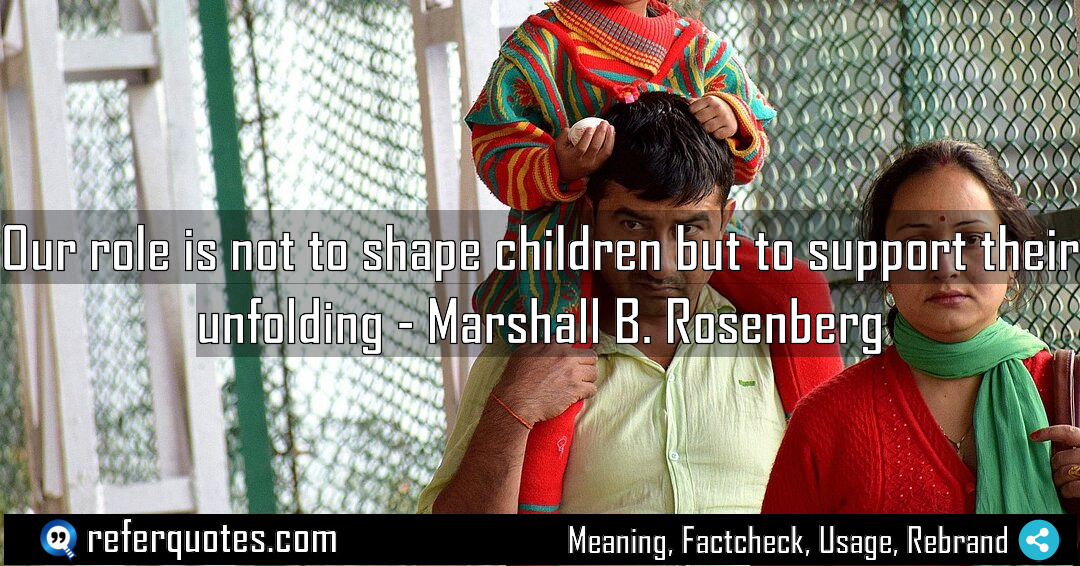
Our role is not to shape children but… it’s a game-changer for parents. This quote flips traditional parenting on its head, moving us from architects to gardeners. It’s about nurturing what’s already there, not building from a blueprint.
Share Image Quote:
Table of Contents
Meaning
At its core, this is about shifting from a controlling mindset to a supportive one. We’re not here to mold our kids into a predetermined image; we’re here to help them become their most authentic selves.
Explanation
Let me tell you, this was a hard one for me to internalize at first. We get so caught up in the “I need to fix this” or “I need to guide them there” mentality. But Rosenberg is asking us to see children as complete, whole people from the start, just with their own unique timeline for unfolding. Think of it like this: you’re not the sculptor chiseling away at a block of marble. You’re the gardener providing the sun, water, and good soil. You don’t pull on the sprout to make it grow faster; you trust the process. Your job is to create the conditions for their innate potential to flourish. It’s a profound shift from doing to a child to being with a child.
Quote Summary
Reading Level71
Aesthetic Score91
Origin & Factcheck
This comes straight from Marshall B. Rosenberg’s 2005 book, Raising Children Compassionately: Parenting the Nonviolent Communication Way. It’s a core tenet of his Nonviolent Communication (NVC) framework. You won’t find it correctly attributed to anyone else—this is pure Rosenberg, born from his life’s work in conflict resolution and compassionate communication.
Attribution Summary
Where is this quotation located?
| Quotation | Our role is not to shape children but to support their unfolding |
| Book Details | Publication Year/Date: 2004; ISBN/Unique Identifier: 9781892005140; Last edition: PuddleDancer Press, 1st Edition, 48 pages. |
| Where is it? | Chapter: Supporting Growth, Approximate page from 2005 edition |
Context
In the book, this idea isn’t presented in a vacuum. It’s the antidote to what he calls “life-alienating” communication—all the shoulds, demands, and judgments we unconsciously throw at kids. The quote sits within a larger conversation about moving away from reward/punishment models and towards connection and mutual understanding. It’s the foundation for everything else.
Usage Examples
So how does this actually look in the wild? It’s less about a specific script and more about a posture.
- For the frustrated parent: Instead of saying, “You will share that toy right now,” you might get curious. “You’re really holding onto that truck tightly. I wonder what’s going on for you?” You’re supporting their emotional unfolding instead of forcing a behavior.
- For the educator: Instead of just teaching to the test, you create projects that allow for individual passion and unique solutions. You’re supporting the unfolding of their intellect and creativity.
- For the mentor or coach: You resist the urge to give them the “right” path. You ask powerful questions that help them discover their own answers, supporting the unfolding of their own wisdom.
To whom it appeals?
Share This Quote Image & Motivate
Motivation Score87
Popularity Score85
Shareability Score88
FAQ
Question: Doesn’t this just mean being permissive and letting kids do whatever they want?
Answer: Oh, that’s the biggest misconception, and it’s a crucial one. Absolutely not. Supportive boundaries are essential. The difference is in the energy behind the boundary. It’s not “Because I said so,” but “I’m setting this limit to keep you safe and to care for everyone’s needs.” You’re still the adult, you’re just leading with empathy.
Question: How do you “support unfolding” when a child is clearly making a bad choice?
Answer: You get alongside them. You don’t abandon them to the consequence. You might say, “I see you chose to do X, and now Y is happening. That looks really tough. What do you think you might try differently next time?” You’re the safe harbor for them to learn from the mistake, not the judge pronouncing sentence.
Question: Is this only for young children?
Answer: This philosophy scales beautifully. Think about teenagers! They are unfolding at a massive rate. Trying to “shape” a teenager is a recipe for conflict. But supporting their unfolding—listening to their big ideas, respecting their growing identity—that builds a connection that lasts a lifetime.
Similar Quotes
You know, when Marshall Rosenberg said “Children are never the problem,” he was pointing a finger right back at us. It’s a game-changer that forces you to stop blaming the…
You know, when Marshall Rosenberg said, “It is not our job to make children behave,” he was really flipping the script on traditional parenting. It’s not about control, but about…
You know, that idea that “Our goal is not to make children obey…” completely reframes parenting. It’s not about control, it’s about connection and fostering genuine understanding. It shifts the…
You know, that idea that “Children thrive when they are seen for who they are”… it’s a game-changer. It shifts your entire focus from molding a child to actually connecting…
You know, when Marshall Rosenberg said “Children are not problems to be solved,” he was really onto something. It’s a perspective shift that changes everything about parenting and teaching. Instead…
